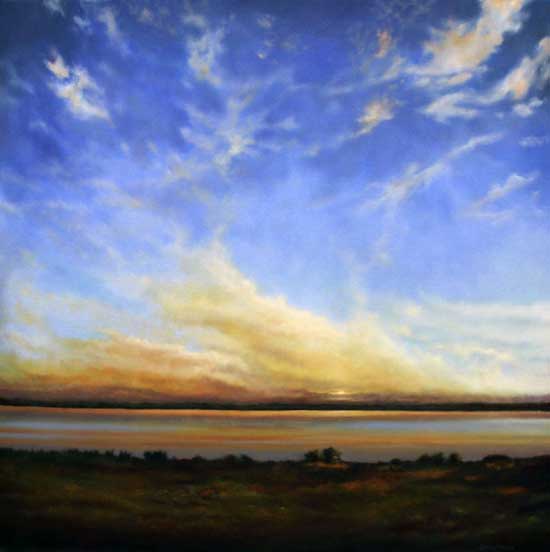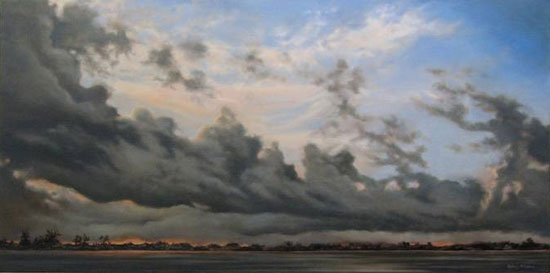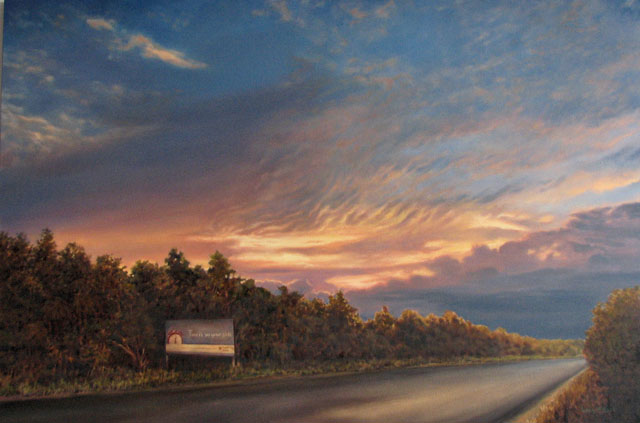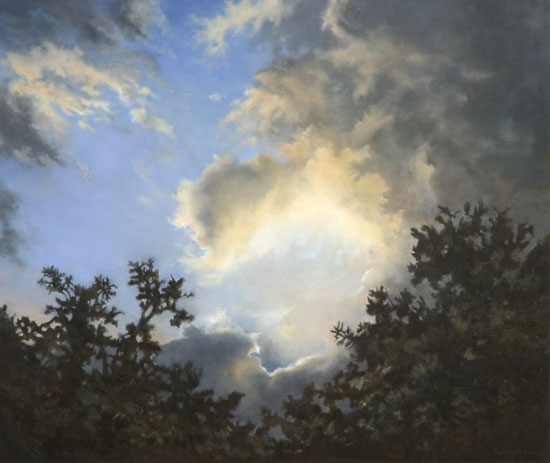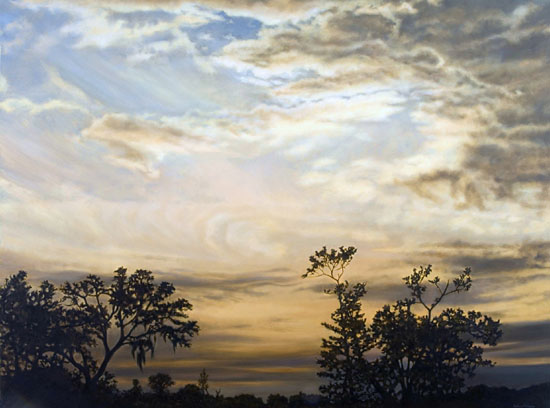
“The Last Stand” by Sydney McKenna, oil on canvas, 36″ x 48″
We know (for certain) little more than what we’ve held onto and then had to let go of.
Letting go of life does not happen easily. Neither for the living nor the dying. In his last moments, my father struggled to hang on with all the effort and energy he could summon after life support was removed. Until he could no more. And without mythology, or stories, but not without precedent, his heart stopped, as did his breathing, and the light in his eyes receded like a wave returning to the Chesapeake Bay, where he’d spent time growing up and where he’d met my mother, the girl next door.
The moment of death—apparent, immediate, and experienced by everyone in the room—shocked and emptied the hearts gathered around his bed—and time stopped, briefly. Immortality was interrupted for every one of us—living and dead—in that cold, fluorescent, and antiseptic little room in the ICU.
To honor the passing of Albert Finney, I elected to watch Big Fish again. It was both an easy choice from among the films of his that I’ve admired, and a difficult one—because I knew I’d have to revisit the experience that made it so emotionally affecting and meaningful to me in the first place. I first watched it not long after my father’s death.
We revisit our grief guardedly, reverently, and cautiously. And it’s only easier when we feel we’re strong enough to bear it again in that safest of mythological places: storytelling.
Grief and trauma and healing are a magic circle, a mandala. At the heart of which is an ancestral story that unfolds the experience of all ages. The retelling of that ancient story to our grievous naivete slows time, concentrically expands into our being like the echoes of generations who finally have a voice to interrupt our childlike, defiant sense of immortality. To give us new ground upon which to stand, that we first experience in much the same way that beings of flight experience a hard landing from lofty enterprise.
Some films have a ritual character for us. We may only watch them when it’s appropriate to engage with their incantations, to bear their uncanny spiritual propensity to draw out from those ancient hiding places, those ancestral and traditional psychic containers of grief-cum-transformation built in to our being from before time. When death was a preface to life.
The stories these films tell us resonate with where we are in our lives as we watch them anew, because of, or in spite of, our numinous experience of the loss of everything we’d known for sure, connecting with our lives or our grief. Repeated viewings of a film give us the opportunity to leap through time, engage with history and the future, and we’re offered the opportunity to remain beset by nostalgia and sentiment, or to alter the outcome of the future, risking that our old selves may not survive in the altered timeline, and that in our own story we may have to reinvent ourselves partially or wholly.
Among other places in time, Big Fish takes me back to confronting my father about his lies, his stories. Seeking resolution for all of the questions I’ve accumulated over the years, hearing the different iterations told to family and others. It was around the time of his first cancer diagnosis, over the telephone on our weekly call, and I’d had a few drinks and was feeling brave. I remember his voice conveyed an unexpected and genuine humility. He wasn’t defensive, but sounded hurt and contrite. He told me truths I believed. He also afforded me respect for having called him out. Something had settled between us, and definitely in me. Hubris would always be suspect after that and neither one of us could express it before the other. Icarus could now avoid the fall, and no longer had need of his father’s admonitions.
The loss of our first parent has the most impact, regardless of their hierarchical status in our life. When my father died, it was a choice the family had to make, in light of his wishes as discussed with our mother. He was in the hospital, on life support, and that was all that was, or could, keep him alive—and it was unsustainable. He was conscious and aware, and my mother had discussed with him his lack of options and his decision regarding his living will. There was no choice but to pull the plug, with his consent, as a willing and conscious participant. I cannot fathom, nor will I ever know his thoughts and feelings at such a prospect. But what I witnessed was a man both mortally acquiescent and fearfully relieved of all pretense of who he may have become through all the years of his life, by way of all the stories he may have told himself, or shared with others to have defined, in whatever way, the character he was able to create of himself. This also told me truths I believed.
As our family gathered around his hospital bed when the machines were turned off, I held his hand, I sobbed and told him how much I loved him, and our family did the same. But his eyes were turned to something beyond us all, unfocused, turned inward to something only he could know, and outward to some point beyond whatever horizon was available to him in that little room full of everyone close that he’d ever loved.
I looked at him one last time, and with my fingers I closed the lids over his empty eyes. Because immortality can only be suspended for so long before it’s unbearable.
Religious dogma would suggest that eternity is time everlasting. I think that’s a function of grief, of how memory works when death happens. Because that’s how we remember the moment of death not our own. It becomes fixated in our timeline. But I like the eastern metaphysical definition that eternity is timelessness. Time stops when you die. Time stops when someone dies in front of you. The notions of past and future die when life is accepted as an extended series of present moments. The look of a man facing the unknown, not focused on any discernible interior or exterior horizon, is suspended in awe of the mystery of being and is freer than anyone surrounding him locked into the moment of their grief. For all parties involved, there is little more than that present moment. And it exists outside of time. What goes on for what feels like forever is only memory.
The memory of my father’s death would go well beyond that week of dying and memorializing immediate grief.
I arrived home following the conventionally ritualized emotional chaos of grieving, and was wholly alone for the first time since the day my mother rang me from the hospital, the morning after I’d gone to the family home to get some rest, to inform me it was time to pull the plug. And after my childish recriminations, I cried uncontrollably in the safety of the shower. Wholly alone with my grief for a death that had yet to happen, but was unavoidably approaching. The child, the boy, the teenager, the young man, the adult, all wanted to wash it away, to rinse it off. But I could not come clean. There was no ablution. I had to man up like the paratrooper my father once was and dive into this experience headfirst and hope I could pull the ripcord in time.
But back home, after all that—the week of the hospital, the death, the obituary, the eulogy, the family leave from work—I had to return to an empty house and begin a life ahead without my father. I was not lonely, but I had yet to feel alone as a man. Whole, for once. My own man with no living paternity. Like an orphan with some spiritual imperative that I had yet to understand.
It would be years before I would. Spirit is the dynamism of the human personality. The agent of transformation. It’s a generative force that moves through our mind and body. Instinctual and archetypal patterns of behavior that compel or inspire. It could belong to you, accumulated from your past experiences:trauma, memories, dreams, reflections. It could belong to the human race, or your family history, an accumulation of the experiences of ancestors bequeathed to you genetically or behaviorally, unconsciously. It could feel religious or divine:gods, devils, daemons, angels, demons, ghosts. Or psychological, as pathology, anxiety, neurosis, talent, or grace. But in any case, whatever its source, by its behavior, it becomes a resource to tap into, and by which we are compelled to act. When we are ripe or ready, spirit constellates as an imperative to act. To move us so that we may move ourselves along the path, to blossom or wither, for the next season of our being. It is by the creativity of nature, that by our own nature, we become creative.
Creative inspiration, so easy to recognize but difficult to harness, bears before it the mask of repressed conflicts, trauma, and neurosis. That stands between us and the face of spirit and is the subject of much art. The process of creating is the same process by which our conflicts, trauma, and neuroses are removed as subjects so that we may experience the generative aspect of spirit and move beyond our present place into something new. And it may present itself in images or forms wholly unexpected or unprecedented in our lives.
That first night, as I was about to undress, I sat in the chair beside my bed, and it all came out. All the grief and the tears hidden behind the facade of the formalism, the ritual, the convention. Behind the telling of my father’s story to an audience of family, friends, and strangers.
And I did not grasp it then, but I would no longer be able to tell my father’s story—if ever I could have done it faithfully to begin with—except to an audience who needed to hear his myth through the eyes of his son. I could only tell my story from that point on. And that was frightening. For I had no experience to begin such an imposing enterprise.
Alone, with the last light left on in the house. In the chair beside my bed. My elbow on my knee. My forehead in my hand. I cried like I’d not cried since I was a child. And I closed my eyes. And I had a vision. An archetypal image rose from the grief that had coiled around my heart. I saw from a point of view outside myself, a great serpent. It appeared from behind me, its great head above my head, and it planted a fang, deep into my skull, reaching down into the reptilian part of my brain—where sensation and memory and emotion and instinct lay—and I could see the venom inside the fang injecting into me, the poison of grief.
My father feared snakes pathologically. My mother, seemingly fearless of snakes, may have otherwise religiously assigned to them the evil of the Bible. I loved them as a child and had fantasized about raising them in an underground vault in the yard of the farmhouse we lived in when I was in the fifth grade—when my parents’ marriage was uncertain, where sexual trauma had happened, where we were poor for a while, and lived off of grace and ingenuity, where my father experienced his first midlife crisis, where I was sensitive to the anxiety and neuroses of mysterious parental secrets, and full of prepubescent fears and uncertainty, feeling like an outsider in so many ways. I would fantasize about milking the snakes to create antidotes. A meaning that became clear to me as an adult when I would come to know snakes to be creatures of healing and gnosis. Animations of the spirit rising from the dark places of the earth. Coiled around the staff of Asklēpiós painted on the side of every ambulance my parents ever rode in during their 10-year tenure as rural rescue squad volunteers.
The venom of grief was a transformative medicine preparing me for a life yet lived. I had a childish skin I would need to shed, and I could only do that by the inoculation of the spirit of the serpent. No apples, no devils, no temptation, no fear. No immunity. But I would gain some measure of resistance, to build up strength against grief to come. Most especially, against the coming of age of my own mortality.
Over the course of that week, something strange happened. I would go to bed, lights off, wide awake, mild anxiety, spiritual tension, mind full, house quiet, with a sense of all the negative space in the rooms of the house, like empty receptacles to be filled with whatever my mind might pour out into them. It was a new kind of feeling alone. A sensory response to all that was empty around me.
I would sense an intruder, an unwelcome presence in the house. In the next room. It would elicit fear and occupy my full focus. I would muster the kind of courage only a younger man full of fear could muster. The hyperbole of untested bravery. The adrenaline of fight over flight. And I would leap out of bed, armed with whatever blunt object was available, and enter boldly, yelling aggressively as I strode into the next dark room to fend off whatever adversary lay in wait. Then I’d switch on the light to find nothing but emptiness. This happened once or twice that first time, and maybe another night or two before it subsided.
I know some family and friends would speculate that it was the ghost of my father, perhaps come back one last time. A visitation of spirit to allay my grief. Or with some message from the afterlife. But I knew that would not have mustered my fear, it would have summoned my awe. And anyhow, I don’t believe in any of that. I have enough ghosts in my life. It was something very real, but It was something else.
Marie-Louise von Franz was hired at eighteen years of age by Carl Jung to translate medieval Latin alchemical texts. She would later become one of the first-generation Jungian analysts. Her intimacy with Jung’s ideas would make her an expert exponent of them. In one of her books, she intimated her inability to initially grasp one of Jung’s key concepts, that of Active Imagination. She expressed her frustration with the fact that others around her, some sharing my own temperament, showed more facility in their attempts.
Active Imagination is a therapeutic technique, an exercise in creativity, whereby one allows the contents of the unconscious to flow unrestricted, through the imagination, and express themselves in some artistic and imaginative creative form, more especially in a form that the subject is not well versed in, to enable the ego to engage in a kind of Platonic dialectical relationship with the objective Other within. The idea being that there is more of an opportunity for mistakes to be made, to find chinks in the armor, to allow that inner voice which was otherwise assiduously overlooked or repressed, to make a statement in whatever unfamiliar creative language alleviated the restrictions of habit and form. The key is that it must be emotionally provocative to consciousness, to the ego—the imaginative construct must elicit the same emotional reality as we would experience if we encountered it in real life. You may imagine meeting up with a lion, but if your experience of that encounter does not elicit the same tension and trepidation and trigger the same instinctual fear, then you have not achieved Active Imagination, just pedestrian fantasy.
Sometime later, von Franz found herself alone in her cabin in the mountains of Switzerland at night and heard a sound outside. There had been reports of local intruders with violent intent. She found herself fearful for her life and entirely convinced that someone was trying to get in. She, a potential victim of violence, responded by grabbing a staff or a gun to meet the threat—full of adrenaline and fear, fully engaged in defending herself, only to discover that she had engaged finally in an act of Active Imagination. To encounter a projection of her own unconsciousness so engaging that her rational, thinking mind would submit to the irrational, emotional image. This was profound.
For a while, I thought what I experienced was an encounter with death personified. What else could it be? I mean, my father had just died, right? But after reflection I understood it was the spectre of my own mortality. Imposing upon me a long-forgotten secret from a time when death was a preface to life. Once the threshold of my unconscious idea of immortality was breached in that hospital room, through my grief, through communal convention, there was no passing back through that door. I would have to live, understanding that I would die, not just knowing that it would happen to me. To live against this new backdrop, this scene change, this sea change, I would have to live differently. I would experience living differently. The experience of time would be altered, against a backdrop of timelessness, eternity, and mortality.
I would spend the next few weeks processing my grief by engaging in the ritual of cleaning house, literally scrubbing and reorganizing all those “empty” spaces in my home. Reaching the kind of catharsis I couldn’t in the shower that day of my father’s death. My imagination was full, and my dream life so active, it became necessary to start a dream journal to process it all.
Our imaginations are always active and adaptive. Whether we’re remembering events in our lives, reexperiencing a film or book or story, reimagining our future, lying in bed unable to sleep, processing our grief by whatever means, or attempting to confront our past in the hopes of a better outcome. Accepting the present moment as the death of time, allowing the past and the future to die to a succession of present moments, allows us the opportunity to alter the timeline. Just because trauma has the potential to fix our emotional development in a particular place and time, does not mean we are stuck there without hope of rescue. Anamnesis, is the active opposite of passive amnesia—the remembering. Indeed, sometimes that’s enough, but if we allow ourselves to actively engage emotionally, outside of the conventions of nostalgia or repression or sentimentality, we are free to pick up where we left off, and start growing again.
Big Fish isn’t the only film I associate with my father’s death. Indeed, there is another, more synchronistic, more immediate, and possibly more potent film experience.
The evening of my father’s memorial at the church, my mother and I sat outside, had a long talk, and she allowed me (this one time) to drink alcohol in her house. It was a strange kind of release and contentment, our talk. For we had rarely ever gotten along. But life would be different now. A future less circumscribed by past relationships. The hard part felt finished. She was tired, I was wide awake. And she went off to bed.
Quite decidedly I would stay up with a movie. And as I perused my father’s DVD collection, I found a few he’d burned to disk. One, a film I’d wanted to see but hadn’t. There it was, labeled in his own handwriting, transferred by his own hand, and handed to me by circumstance or coincidence on the evening of the end of that difficult week: Darren Aronofsky’s The Fountain. A movie about awe in the face of death, the universal and instinctual reach for immortality, the search for meaning, acceptance of mortality, and that “death is what makes us special” vis-a-vis our eternal maker..
The film’s themes were resonant, potent, and impressive: time shifts; the earthy v. airy archetypal themes of an ancient past and fantastical future flanking a central and transformative present, heavy with portent and difficult emotional subject matter; themes of regeneration, acceptance, resignation, grief, hanging onto and letting go of. In the final scene, the protagonist finds and plants the (empty) seedpod of the sweet gum tree on his dead lover’s grave. By happenstance, I’d later find one or two of these seedpods.
My mother created a memorial to my father, gravestone included, in the side yard of their house, even though he’d been cremated. We added tokens of our memory and our love, scattered and buried some of his ashes there, gathered a year later and sang songs with guitar.
Later it was less well tended, like our memories and our love. I would tend to it, in honor of my father on one of my later visits. Because nature had taken over and absorbed all the immediacy and hard lines of our experiences and given them curves and growing things that would subsume the potency of our grief. But I got a chance early on to plant one of those sweetgum seedpods in a nod to the unexpected gift my father had left me for that quiet night alone in his living room with The Fountain, sitting in his chair, after his memorial service. That weird, rare opportunity to grow into something, to have my experiences converge upon these themes like nature converges on the opportunity of death to fertilize new life. Like in the film: when the flowers sprout out of the heart of the protagonist in a violent and fecund blossom of life after his tasting of the sap of the tree of life. But also, like at the end of the film, my seedpod, planted, was empty of seeds. And nothing could grow from it that wasn’t already in my heart. It would never show up on the landscape next to the house, but it might grow into a story. Perhaps my own.
The Fountain felt more transcendent in dealing with the acceptance of grief and mortality. But Big Fish is the film that touched so strongly on that sense of being happily led on and ultimately deceived and betrayed by those “dad” tales, whose exaggerations and flourishes keep you both entranced and suspicious of the truth of who your father was, for many years to come, and the possibility of what your past may become to your future self. Somewhere in there was the potential that the conflict between the two may end up leaving you in awe of what your own life could be, given the latitude to write your personal story.
I’m midway between the age I was then and the age my father was when he died. Up to now, those experiences have felt like an empty seedpod. Reflecting on them has offered me a medium to tell my story. Milking the serpents. Writing it felt sometimes like trying to wrangle the rushing volume of splashes, spritzes, and spray from a spring fountain gushing up out of the earth, and then directing them to perform a play for an audience of one, without getting wet. But getting wet isn’t such a bad idea. If all you have is your bare hands, you have to risk the serpents’ bite, climb into the fountain if you want to catch the fish. And then you have to let them go. But sometimes, if you embrace something in the right way, it feels just like letting go of it.
The feeling I’m left with after having embraced the process of telling this story, is reminiscent of the feeling I felt after receiving one of my father’s hugs. Transformed, unmasked, regenerated. And after letting go, perhaps happily unresolved.
Don Minson is a UVa alumnus, works in Business Administration, and lives in Charlottesville, Va. He’s an accomplished music festival photographer who shoots under the pseudonym Wiley Quixote, and has previously contributed photographic illustrations to the r.kv.r.y. quarterly literary journal. In his spare time, he enjoys listening to music, watching films, drawing, painting, writing poetry, playing guitar, Jungian psychology, and learning how to write prose.





